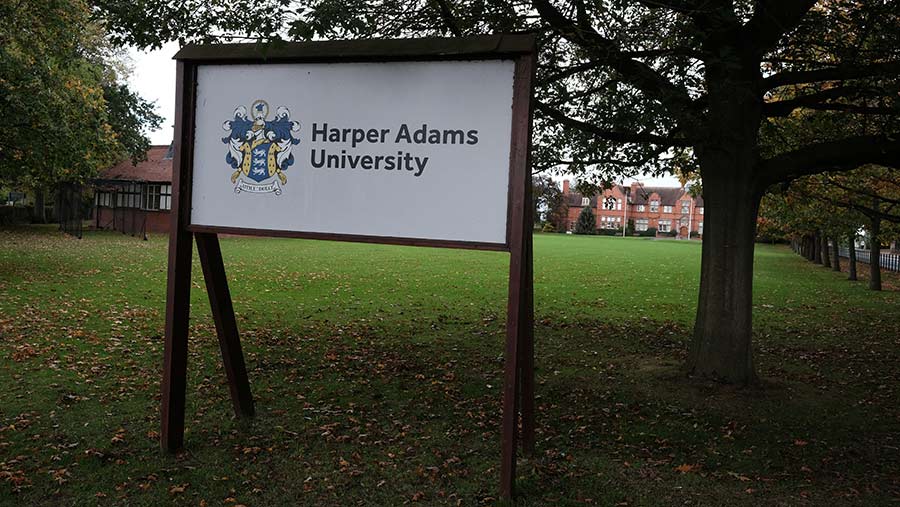Harper Adams opens UK’s first school of sustainable farming
 © MAG/Colin Miller
© MAG/Colin Miller The UK’s first School of Sustainable Food and Farming has launched, with the aim of encouraging regenerative farming practices to help the industry meet its net-zero ambitions.
The partnership between Harper Adams University, the NFU, Morrisons and McDonald’s will help the farming industry in the green recovery from the Covid pandemic.
Courses will be provided by the Shropshire-based university, designed using its work on sustainable farming and food production.
See also: Q&A Natural England: Farming and fighting climate change
Virtual courses will cover a range of topics, including carbon sequestration, the potential of green energy production on farms – including anaerobic digestion plants – and understanding the value of carbon.
In addition, on-farm learning with university tutors will take place to offer real-world practice. Courses will be developed and run by the UK’s leading experts in agronomy, veterinary practice and nutrition.
Training farmers
There will be undergraduate courses to train new sustainable farmers; short courses and apprenticeships to upskill the current farming workforce; and research posts.
The school will also act as a hub for sharing the latest thinking and learning on sustainable farming and will be involved in policy engagement – to ensure the farming sector gets the support and advice it needs.
“The way Britain – and the world – farms is changing, and the future is upon us,” said Professor Michael Lee, deputy vice-chancellor at Harper Adams University.
“We need to recognise that, and to understand that the future sustainable production of our food is critical.
“It is time for modern agricultural institutions to develop the systems we need to support this production for the 21st century – such as this school, which brings together the expertise we have at Harper Adams with the experience of industry, wherever it is needed in the country.
‘Pioneering’
“What we are doing here is pioneering, and it will help the UK to lead the world in agricultural thinking and practice.”
NFU president Minette Batters added: “In Britain, farmers have an ambition to reach net-zero greenhouse gas emissions by 2040, and the School of Sustainable Food and Farming will help us get there.
“It will help our farmers – both established and new – take on the role of world leaders in climate-friendly food production, paving the way for farming across the world in a sustainable and beneficial way.”
Morrisons said the school would play an important part in helping all of its farmers and suppliers to achieve its Net Zero Agri target by 2030. And McDonald’s said it would help it to better understand and implement sustainable farming methods that can be used by British and Irish farmers that produce the ingredients for its restaurants, as well as the wider farming industry.
World’s largest vertical farm set for Norfolk
Green energy firm Fischer Farms has started work to create the world’s largest vertical farm, which is due to open next May in Norfolk.
The £25m, 1.61ha plant will offer 25,000sq m (or 2.5ha) of growing space – enough to supply 6.5t of leaf salad such as rocket and lettuce, basil and other leafy herbs, and other fresh produce to UK supermarkets every day.
A range of fresh produce will be grown via a stacked, biosecure, climate-controlled and fully automated system, which will be run on 100% renewable energy.
Backed by sustainable investment company Gresham House, Fischer Farms says the new facility will be able to produce the same amount of food as is possible on 405ha of conventional British farmland without using pesticides.
Tristan Fischer, the company’s chief executive, said: “Our plans use the very latest vertical farming innovations, pioneering technology and 100% renewable energy to enable us to farm more responsibly, sustainably and more productively in order to feed a growing population.”
Fischer Farms already has one of the UK’s largest vertical farming operations, in Lichfield, Staffordshire, which grows a range of short leaf products via a stacked, biosecure, climate-controlled and fully automated system.
